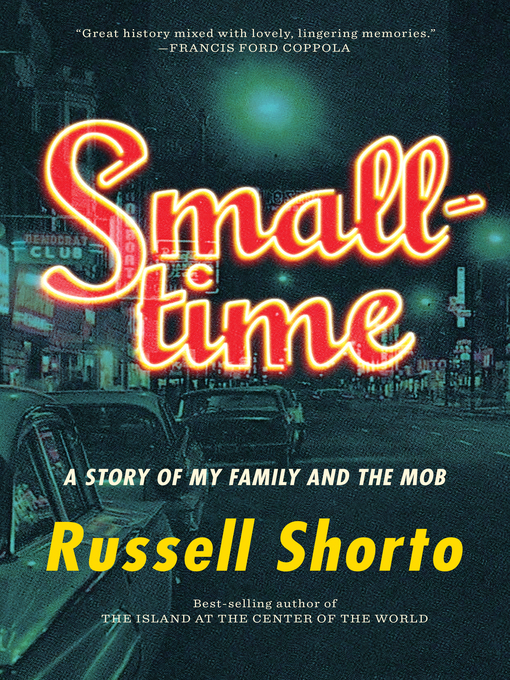
Smalltime
A Story of My Family and the Mob
- اطلاعات
- نقد و بررسی
- دیدگاه کاربران
نقد و بررسی

October 12, 2020
Historian Shorto (Revolution Song: The Story of America’s Founding in Six Remarkable Lives) gets personal with this insightful family memoir about his mobster grandfather’s rise to power in postwar Johnstown, Pa. When a cousin tries to goad Shorto into exploring the family’s checkered past, he first claims it’s “not his thing.” But he soon realizes that researching his grandfather’s life is a rare opportunity to learn how organized crime became “as much a part of mid-century American life as the hot dog.” Shorto digs into his grandfather’s legacy in collaboration with his ailing father, which brings the two closer together. His grandfather, a philandering drunk who died alone at a racetrack in 1981, helped found in 1960 a criminal network that responded to the public’s huge thirst for gambling by setting up gambling operations including eight-ball, backroom card tables, pinball machines, and “tip seals,” a tear-off game much like today’s scratch-off games. The boom spans the 1950s, but became a casualty of reform movements by the anti-Mafia Kennedy administration, as well as state and local governments. In telling Johnstown’s mob story, Shorto presents a fascinating institutional history of small-town organized crime and a moving family saga with equal amounts of detail and heart. Mob history lovers will especially enjoy this colorful account.

November 15, 2020
Historian Shorto vividly portrays the lives of farm-team mobsters, among them his own ancestors. When immigrant Antonino Sciotto and his common-law wife arrived in Johnstown, Pennsylvania, more than a century ago, he changed their names to Tony and Mary Shorto. This change, writes the author, an accomplished chronicler of Dutch Manhattan and other fulcrums of world history, "wasn't just due to vague notions of Americanness....It was also a way of distancing themselves from the past, from the village in the hills of eastern Sicily." Ironically, it was while on a visit to his mother in his homeland that Tony was killed after flashing a money belt stuffed with dollars. He had fathered children by that time, including five girls and, in 1914, a boy named Rosario, Americanized to Russell, the author's grandfather and namesake. After living hand to mouth in childhood with his widowed mother, Russ senior hustled to carve out a spot in the Prohibition era, building a small-city empire that included booze, gambling, and other more or less soft crimes, with some of the money going to the mob in Pittsburgh and some traveling to the ruling Mafia families in New York. Prohibition addressed a national drinking problem, Shorto allows, but it also targeted two groups disproportionately: "urban elites and recent immigrants," with the term "organized crime" also carrying an ethnic connotation that spoke against the "Irish, Jewish, and Italian mobs that grew up around the business of providing alcohol during Prohibition." The implication was that homegrown criminals were noble solitary outlaws against the dangerous, conspiratorially minded new arrivals. The criminal enterprise ran deep but was often peaceful, though violence was certainly not unknown. In a narrative full of sharp twists, Shorto learns, to his surprise, that his own father served jail time "as a teenage gun wielder"--though in later years, his father, thoroughly assimilated, turned to sales and the think-and-grow-rich slogans of the postwar era. A lively addition to the history of Italian American immigration and its discontents.
COPYRIGHT(2020) Kirkus Reviews, ALL RIGHTS RESERVED.

February 1, 2021
With this latest work, bestselling author Shorto (Revolution Song) offers a fast-paced exploration of family roots. This is a multigenerational history tale as well as a localized mob story, about a mystery that slowly unraveled the life of Shorto's grandfather, a mobster and local legend in Johnstown, PA. That history is in turn cased inside the story of small-town organized crime, which also revolves around many of Shorto's other older relatives. The resulting engaging narrative showcases a microcosm of American history, following the lives of the author's Italian ancestors and their children, showing how they created their own hierarchy and establishment, as illegal as some of it was, to circumvent their lack of representation in the local community in an attempt to live their American Dream. Shorto quotes from extensive interviews with former mobsters and friends who clarify or correct the research he found in local newspapers and uncovers family secrets to reveal the colorful history of his relatives--and their entanglements with the law. Also included are numerous family photographs and even favorite family recipes. VERDICT This delightful account is a definite must-read for those who love mob movies and many of their tropes, both dramas and comedies, and who enjoy family sagas that are uniquely American.--Amanda Ray, Iowa City P.L.
Copyright 2021 Library Journal, LLC Used with permission.

February 1, 2021
Most accounts of the Mafia center around the big cities, but in its heyday after WWII, mobsters also set up rackets in small towns across the country. Shorto (Revolution Song, 2017) shines a light on the organized-crime action in Johnstown, PA, where his grandfather was the number-two man. Writing in a direct, conversational manner, Shorto uses his complex, often painful family history as a portal into a broader view of the Italian American experience, from the rocky hills of Sicily to the steel mills of America. The criminal supply chain established for alcohol during Prohibition expanded to include all kinds of puritanically shunned entertainments run by organized crime, especially gambling. Shorto combines academic sources with news stories, court documents, FBI files, and extensive interviews with his namesake grandfather's surviving associates and family members to produce a truly excellent, often harrowing investigation. Clearly, it was important to Shorto to research, understand, and confront his family's history, and he has created a compelling, fresh, and resonant take on a key and fascinating aspect of American history. This will have wide appeal.
COPYRIGHT(2021) Booklist, ALL RIGHTS RESERVED.




دیدگاه کاربران